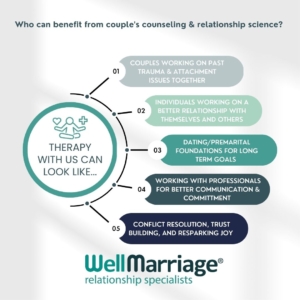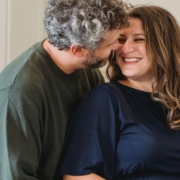Why is there so much Conflict (and What to do About It)
Humans are notoriously complex creatures and this complexity often follows us and is expanded within our relationships. Sometimes, these complexities turn into high-conflict cycles that are difficult to resolve, whether it’s with our partners, others, or even just ourselves.
Why do we Experience Conflict?
We all bring fears, anxieties, communication styles, and past problems to relationships.
It’s common that as our relationship grows through time, we’re confronted with these realities within ourselves. Sometimes we reach a place where rather than dealing with our internal conflicts we project these feelings onto our partner—even when their intentions are good or they are just being themselves.
The first step to repairing this is to understand our own feelings and where they originate. Realizing that almost everything we feel has its roots somewhere within us allows us to take our partner’s actions and reactions out of the picture. When we understand our own emotions, they’re easier to talk about and work through – and our conversations can be more productive than, say, arguing about chores.
Another common scenario is that we don’t feel comfortable expressing our needs clearly, or maybe when we do voice them, we don’t feel as if they are understood or accepted. Having different communication styles, expectations, and different mindsets about complex situations often amplifies these issues. To de-escalate conflict, agree to take a break and agree to come back. Use this break time to outline your needs and expectations clearly to yourself, so you can present them calmly and address them as a team.
It’s important to remember that all our behaviors fill some need or desire. We watch television or take a walk to relax; we go to work so we can eat and pay our bills; we argue about the chores because we have a need for order or control; we reach fight, flight, or fawn to protect ourselves. The list goes on…
Learning to pause and recognize what our needs are in the moment, and those of our partner, can take practice, but once we understand that we’re all trying to achieve a goal, conflicts come into perspective and are easier to resolve.
The Big Tips
-
Don’t take your partner’s behavior personally
-
Take a break when tempers flare
-
Come back to the disagreement with cool heads
-
Clearly express your needs
-
Hear your partner and try to understand their point of view
-
Remember you’re on the same team
-
Approach conflict with a mindset of solution-seeking
Understanding that our behaviors, and those of our partner, are a step toward reaching a goal also helps us to not take things personally, which allows us to move ahead with seeking a solution and common ground. When we take things personally, we often escalate the situation with a desire to “win” the argument. This can also look like rigidly chasing after one solution when a compromise would soothe both parties. Remember to come to the conflict in good faith that you’re both trying to find a win that meets both of your needs.
Flooding
When emotions take over during conflict, it’s referred to as flooding. This happens when we are driven by our anger, insecurities, and personal agendas – so much so that these factors take a higher priority than a workable compromise or our partner’s feelings.
Flooding takes an escalation of arguing or yelling into verbal abuse or shutting down, depending on your communication habits. In these moments we can do incredible damage to our partner by making them feel alienated, unimportant, and unheard.
When our voices start to rise and hearts begin to pound, remember to take a beat. We need to gather our thoughts in a quiet space to define our own needs, and then figure out how and when to communicate them clearly.
This can take practice, especially if we are used to letting our emotions run rampant in these moments. We may feel slightly appeased after the flooding, but it inevitably causes extra damage to our relationships—damage that is harder to repair.
When to Seek Guidance
Even with our best efforts, we can’t always break these conflict patterns by ourselves. Maybe one partner is progressing and doing great but the other isn’t interested in growing out of the negative conflict habits. Both partners may try and not quite succeed in establishing new communication methods.
This is where a skilled relationship therapist, like ours at Well Marriage, can help couples envision and achieve deeper relationship bonds. Our therapists get to the heart of these issues, baggage, and patterns. They give you the tools you need and offer a safe space to express each partner’s point of view and teach methods for healthier communication. Even if one partner begins the therapeutic journey, it often helps things at home – and typically the other partner will decide to join after seeing positive changes.
An interesting fact about couples therapy is that “the average person receiving couple therapy is better off [by the end of their sessions] than 70%–80% of individuals not receiving treatment—an improvement rate that rivals or exceeds the most effective psychosocial and pharmacological interventions for individual mental health disorders” (Fam Process, 2022.)
Through 40 years of clinical experience, our team has helped over 15,000 couples with our modern, strengths-based marriage counseling and couples therapy.
We help couples find their way back to each other. Having improved relationships improves our self-esteem as well as how we relate to the world around us.











